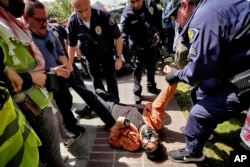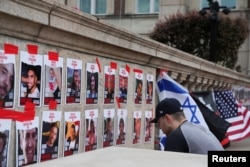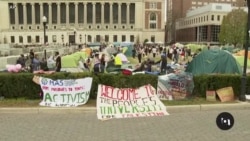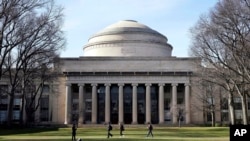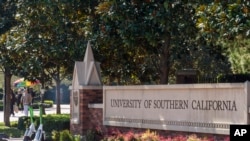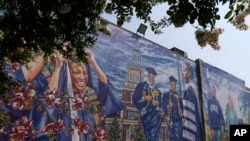Student Union
US police clash with students who demand colleges cut financial ties to Israel
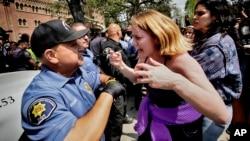
Police tangled with student demonstrators in the U.S. states of Texas and California while new encampments sprouted Wednesday at Harvard and other colleges as school leaders sought ways to defuse a growing wave of pro-Palestinian protests.
At the University of Texas at Austin, hundreds of local and state police — including some on horseback and holding batons — clashed with protesters, pushing them off the campus lawn and at one point sending some tumbling into the street. At least 20 demonstrators were taken into custody at the request of university officials and Texas Governor Greg Abbott, according to the state Department of Public Safety.
A photographer covering the demonstration for Fox 7 Austin was arrested after being caught in a push-and-pull between law enforcement and students, the station confirmed. A longtime Texas journalist was knocked down in the mayhem and could be seen bleeding before police helped him to emergency medical staff who bandaged his head.
At the University of Southern California, police got into a back-and-forth tugging match with protesters over tents, removing several before falling back. At the northern end of California, students were barricaded inside a building for a third day at California State Polytechnic University, Humboldt. The school shut down campus through the weekend and made classes virtual.
Harvard University in Massachusetts had sought to stay ahead of protests this week by limiting access to Harvard Yard and requiring permission for tents and tables. That didn't stop protesters from setting up a camp with 14 tents Wednesday following a rally against the university's suspension of the Harvard Undergraduate Palestine Solidarity Committee.
Students protesting the Israel-Hamas war are demanding schools cut financial ties to Israel and divest from companies enabling its monthslong conflict. Dozens have been arrested on charges of trespassing or disorderly conduct. Some Jewish students say the protests have veered into antisemitism and made them afraid to set foot on campus.
Columbia University averted another confrontation between students and police earlier in the day. The situation there remained tense, with campus officials saying it would continue talks with protesters for another 48 hours.
On a visit to campus, U.S. House Speaker Mike Johnson, a Republican, called on Columbia University President Minouche Shafik to resign "if she cannot bring order to this chaos."
"If this is not contained quickly and if these threats and intimidation are not stopped, there is an appropriate time for the National Guard," he said.
Shafik had set a midnight Tuesday deadline to reach an agreement on clearing an encampment, but the school extended negotiations, saying it was making "important progress."
On Wednesday evening, a Columbia spokesperson said rumors that the university had threatened to bring in the National Guard were unfounded. "Our focus is to restore order, and if we can get there through dialogue, we will," said Ben Chang, Columbia's vice president for communications.
Columbia graduate student Omer Lubaton Granot, who put up pictures of Israeli hostages near the encampment, said he wanted to remind people that there were more than 100 hostages still being held by Hamas.
"I see all the people behind me advocating for human rights," he said. "I don't think they have one word to say about the fact that people their age, that were kidnapped from their homes or from a music festival in Israel, are held by a terror organization."
Harvard law student Tala Alfoqaha, who is Palestinian, said she and other protesters want more transparency from the university.
"My hope is that the Harvard administration listens to what its students have been asking for all year, which is divestment, disclosure and dropping any sort of charges against students," she said.
Columbia encampment inspires others
Police first tried to clear the encampment at Columbia last week, when they arrested more than 100 protesters. The move backfired, acting as an inspiration for other students across the country to set up similar encampments and motivating protesters at Columbia to regroup.
On Wednesday about 60 tents remained at the Columbia encampment, which appeared calm. Security remained tight around campus, with identification required and police setting up metal barricades.
Columbia said it had agreed with protest representatives that only students would remain at the encampment and they would make it welcoming, banning discriminatory or harassing language.
On the University of Minnesota campus, a few dozen students rallied a day after nine protesters were arrested when police took down an encampment in front of the library. U.S. Representative Ilhan Omar, whose daughter was among the demonstrators arrested at Columbia last week, attended a protest later in the day.
A group of more than 80 professors and assistant professors signed a letter Wednesday calling on the university's president and other administrators to drop any charges and to allow future encampments without what they described as police retaliation.
They wrote that they were "horrified that the administration would permit such a clear violation of our students' rights to freely speak out against genocide and ongoing occupation of Palestine."
Netanyahu encourages police response
Israeli Prime Minister Benjamin Netanyahu lashed out at the pro-Palestinian demonstrations on U.S. college campuses in a video statement released Wednesday, saying the response of several university presidents has been "shameful" and calling on state, local and federal officials to intervene.
Students at some protests were hiding their identities and declined to identify themselves to reporters, saying they feared retribution. At an encampment of about 40 tents at the heart of the University of Michigan's campus in Ann Arbor, almost every student wore a mask, which was handed to them when they entered.
The upwelling of demonstrations has left universities struggling to balance campus safety with free speech rights. Many long tolerated the protests, but are now doling out more heavy-handed discipline, citing safety concerns.
At New York University this week, police said 133 protesters were taken into custody and all had been released with summonses to appear in court on disorderly conduct charges. More than 40 protesters were arrested Monday at an encampment at Yale University.
See all News Updates of the Day
US remains top choice for Indian students going abroad
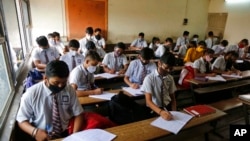
About 69% of Indian students traveling abroad for their studies chose the United States, according to a Oxford International’s Student Global Mobility Index. Other popular choices were the United Kingdom, Canada and Australia.
Education Times reports the main influencers for deciding where to study abroad – for Indian students and others – were parents. (April 2024)
Malaysian official: Schools can’t turn away from global tensions
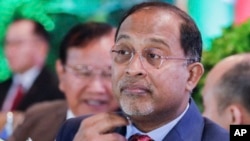
Zambry Abdul Kadir, Malaysia’s higher education minister, said protests spreading across universities in the United States show that schools can’t ignore political tensions.
Helen Packer, reporting in Times Higher Education, said the minister reminded educators that universities are key in the development of leaders, individuals and societies. (April 2024)
Social media breaks are difficult, but necessary

Between online classes, maintaining social connections and working on projects, college students can have a hard time disengaging from the demands of technology.
In Florida International University’s PantherNOW, Ariana Rodriguez offers strategies for taking a break from social media. (April 2024)
- By Melos Ambaye
Many master's degrees aren't worth the investment, research shows
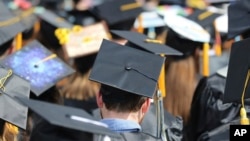
Nearly half of master's degrees have a negative financial return, according to new research by the Foundation for Research on Equal Opportunity, an economic research organization.
The study indicates that many graduate degree programs do not increase lifetime earnings enough to be worth it.
While 23% of bachelor’s degree programs yield a negative financial return on investment, 43% of two-year degrees and master’s degrees fail to deliver a return, according to the study by Preston Cooper, a senior fellow at FREOPP.
Cooper assessed the return on investment for 53,000 degree and certificate programs to determine whether a student’s lifetime earnings outweigh program costs and the risk of not completing their degree.
His findings show that a student’s field of study was the overriding indicator of return on investment at the undergraduate and graduate level.
Engineering, computer science and nursing bachelor’s degrees have high financial returns on investment, while programs in education, fine arts, psychology and English usually have low returns.
Graduate degrees in medicine and law tend to have strong payoffs. But a large share of master’s programs, including the MBA, frequently have low payoffs, according to Cooper.
Although workers with master’s degrees earn 16% more than those with only bachelor’s degrees, Cooper says the figure fails to account for students who had “higher preexisting earnings potential.”
“MBA students typically have high preexisting earnings potential, having often chosen high-ROI undergraduate majors such as finance and economics,” Cooper writes. “So the MBA adds little value on top of that.”
The study indicates that high starting salaries are predictors of high returns on investment. Degrees with starting salaries of $57,000 a year or more deliver the best lifetime returns.
But the return on investment of a degree can vary depending on the educational institution.
“Students interested in fields with low average pay can still find some schools that do well transforming those fields of study into high-paying careers,” Cooper writes.
The quality of an institution also matters, said William Tierney, professor emeritus of higher education at the University of Southern California.
“An MBA from Harvard is a likely ticket to a good job,” Tierney told VOA. “An MBA from the University of Phoenix, less so.”
But students pursue graduate programs for more than just financial reasons.
“Some degrees open up careers in fields that students may enjoy, such as in the performing arts,” Robert Kelchen, head of educational leadership at the University of Tennessee, Knoxville, told VOA.
“Others can help gain access to social networks or simply help students learn about a topic that is of interest,” Kelchen added.
Cooper told VOA that it might make sense for students in degree programs with low returns on investment to switch majors if they can still graduate on time.
He found the worst outcome for a student’s return on investment is dropping out of college “because they must pay for one or more years’ tuition and spend time out of the labor force.”
Lawmakers who fund higher education have a responsibility in ensuring “higher education delivers on its promise of economic mobility,” Cooper said.
Nearly a third of federal funding, including Pell grants and student loans, pays for higher education programs that fail to provide students with a return on investment, according to the study.
Cooper’s view is that “some schools should shut down low-ROI programs and reallocate institutional resources to programs with a better return.”
“There's definitely this narrative out there that higher education is always worth it, and you should always try to get that extra degree because it will increase your earnings,” he told VOA. “That's reinforced by colleges who make lofty promises regarding their graduate degree programs' outcomes, which all too often fall short.”
Harvard students end protest as school agrees to discuss Gaza conflict
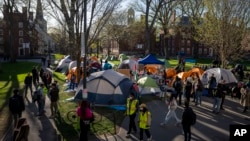
Protesters against the war between Israel and Hamas were voluntarily taking down their tents in Harvard Yard on Tuesday after university officials agreed to discuss their questions about the endowment, bringing a peaceful end to the kinds of demonstrations that were broken up by police on other campuses.
The student protest group Harvard Out of Occupied Palestine said in a statement that the encampment "outlasted its utility with respect to our demands." Meanwhile, Harvard University interim President Alan Garber agreed to pursue a meeting between protesters and university officials regarding the students' questions.
Students at many college campuses this spring set up similar encampments, calling for their schools to cut ties with Israel and businesses that support it.
The Israel-Hamas war began when Hamas and other militants stormed into southern Israel on October 7, killing some 1,200 people and taking 250 hostages. Palestinian militants still hold about 100 captives, and Israel's military has killed more than 35,000 people in Gaza, according to Gaza's Health Ministry, which doesn't distinguish between civilians and combatants.
Harvard said its president and the dean of the Faculty of Arts and Sciences, Hopi Hoekstra, will meet with the protesters to discuss the conflict in the Middle East.
The protesters said they worked out an agreement to meet with university officials, including the Harvard Management Company, which oversees the world's largest academic endowment, valued at about $50 billion.
The protesters' statement said the students will set an agenda that includes discussions on disclosure, divestment, reinvestment and the creation of a Center for Palestine Studies. The students also said that Harvard has offered to retract suspensions of more than 20 students and student workers and back down on disciplinary measures faced by 60 more.
"Since its establishment three weeks ago, the encampment has both broadened and deepened Palestine solidarity organizing on campus," a spokesperson for the protesters said. "It has moved the needle on disclosure and divestment at Harvard."




